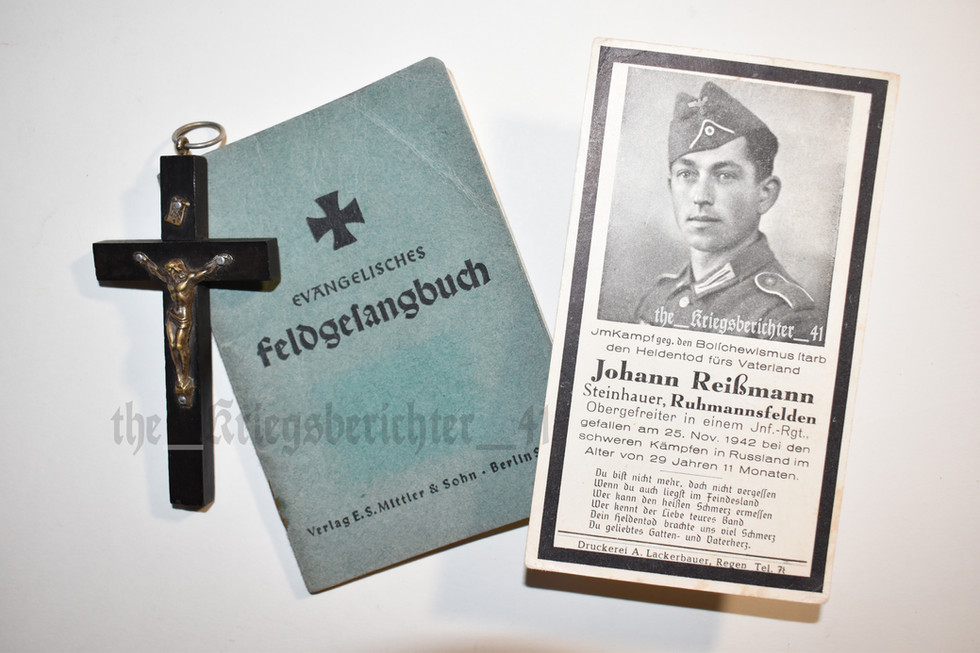Deathcard of Johann Reißmann - 25/11/1942 †
- The Kriegsberichter 41
- Nov 25, 2020
- 3 min read
Updated: Oct 4, 2021
This post is shared as a part of the On This Day Series, Commemorating the death of Johann Reißmann, Who died on this day 25th November 1942, 78 Years ago today †
This post is of a deathcard of the fallen Heer Obergefreiter Johann Reißmann. Seen is not only the deathcard and its reverse (Scanned) but is the usual personal cross (seen alongside other deathcard posts from the collection) but also a small book "Evangelisches , Feldgesangbuch". This is Protestant Field Hymn Book issued to Soldaten of the Wehrmacht. The last photo details the field hymn book alongside the cross. This will be detailed as a separate post in closer detail for the site. The Field hymn book would serve as comfort for the Soldat when away from home, seen alongside the deathcard to serve as remembrance.
Johann was a Quarryman in Ruhmannsfelden, which is a town with its own local government in Bavaria, Germany. He died in Russia in heavy fighting on 25th November 1942 aged 29 years and 11 months.
The deathcard in German reads as:
Im Kamf Geg. Den Bolschewismus starb den Heldentod fürs Vaterland
Johann Reißmann
Steinhauer, Ruhmannsfelden
Obergerfreiter in einem Jnf- Rgt,
Gefallen am 25. Nov 1942 bei den schweren Kämpfen in Russland im
Alter von 29 Jahren 11 Monaten
----
Du bist nicht mehr, doch nicht vergessen
Wenn du auch liegst im Feindesland
Wer kann den heißen Schmerz ermessen
Wer kennt der Liebe teures Band
Dein Heldentod brachte uns viel schmerz
Du geliebtes Gatten- und Varterherz.
The English translation reads as:
In the fight against Bolshevism died the heroic death for the Fatherland
Johann Reißmann
Quarry Man from Ruhmannsfeld
Obergerfreiter in a Infantry Regiment
Fallen on 25th November 1942 during the
Heavy Fighting in Russia at the age of
29 years and 11 months.
----
You are no longer, but don't forget if you are also lying in enemy territory who can measure the burning pain who knows the dear bond your heroic death brought us a lot of pain you beloved husband and father heart.
The seen scan of the reverse in German reads as:
,,Daran erkennen wir die Liebe Gottes,
daß er Leben für uns dahingegeen
hat. So müssen auch wir das Leben für
die Brüder hingeben!"
The English translation of the reverse reads as:
This is how we recognize the love of God
that he lost life for us
Has. So too must we live for
give up the brothers!
The deathcard tells us the life of Johann Reißmann, a quarryman from the town of Ruhmannsfelfen, Bavaria, Germany. Johann was a beloved Husband and farther as written with the passage under the information about his military service and death. The family acknowledging that he is somewhere ling in enemy territories as he has died a heroic death in heavy fighting in Russia. Knowing they may never see him or his body they detail this passage to remember him and that his body is lying away from them, sending their love from his wife and mother to their child/children. The child/children (number unknown) shows that he was a farther, the poor child to hear or grow up and learn of his farther death.
Johann was a Obergerfreiter in a Infantry Regiment, this is not only detailed but can be seen from the white waffen-farb on the M38 side cap but also on the shoulder boards of his M40 tunic seen pictured in a stunning quality studio portrait photograph. Johann one month shy of being 30 years old died in heavy fighting in Russia in 1942. The location and cause of death is unknown but you can only imagine the horrors he may have endured before his death in the fighting on the Eastern front. The religion keeping the morale of the family up and the keeping the memory of Johann Reißmann alive. The religious passage from the bible on the reverse seen with a picture of Jesus and the crown of thorns is from 1 John 4. The deathcard bearing a reminder of the late Johann Reißmann, his military service and sad fate. A memoir of his service and life to be held close by family in the family home. One of many lives destroyed by the war.








Comments